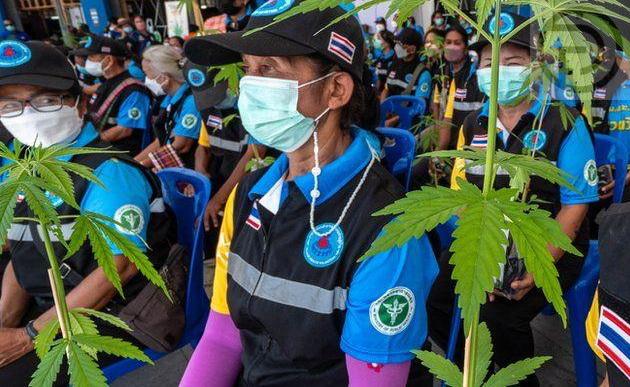As the fragrant tendrils of cannabis intertwine with the spicy scents of Thailand’s famed street markets, the nation finds itself entwined in a knotty debate over the recent decriminalisation of the much-maligned plant.
Only a year since the momentous shift in drug policy, the lush landscapes of Thailand have seen a ‘green rush’ of cannabis dispensaries emerging like mushrooms in the monsoon season, their roots entwining with the local economies of cities and townships throughout the kingdom. The landscape is transformed, with farmers pivoting from traditional crops to cultivating cannabis and entrepreneurs like Wassaya Iemvijan and Nitikrist Attakrist, former lawyers turned cannabis dispensary owners, navigating the turbid waters of a nascent industry.
But a change of tide is perceptible. With a conservative coalition government recently swept into power, the leafy future of the cannabis industry in Thailand faces potential withering. Prime Minister Srettha Thavisin’s intent to “rectify” the legislation looms large over small businesses and agricultural communities that have nestled into the warm embrace of the cannabis trade.

Decriminalisation was met with a bouquet of opportunities for many. Farmers, formerly tethered to the economic whims of traditional cash crops like rice, found new vitality in the cannabis industry. The growth extended beyond the field, enveloping small businesses, providing financial security to families, and enabling enhanced educational prospects for children.
In an intricate dance, cannabis became both a burgeoning business and a lifeline for Thai locals.
Yet, juxtaposed against these tales of prosperity and empowerment is a government fraught with concerns about widespread drug issues, particularly in the northeastern and northern locales of Thailand. In an attempt to stem a perceived tide of recreational use, the government contemplates restricting cannabis utilisation solely for medical applications.
Entrepreneurs like Iemvijan and Attakrist and cannabis advocates vehemently oppose such restrictions, highlighting the economic and wellness advantages that have blossomed since decriminalisation. They argue that cannabis has woven itself into the socio-economic and cultural tapestry of Thailand, offering not just a source of income but an alternative for stress relief and mental health management in a society where these issues often simmer beneath the surface.
The crucial question lingers: Can Thailand manoeuvre a middle path, where regulation and support coexist in a symbiotic balance, fostering a cannabis industry that is both economically viable and socially responsible?
Regulatory missteps could imperil not only the fledgling businesses that have sprouted in the wake of decriminalisation but also jeopardise the livelihoods of those in the rural areas who have staked their future on the crop. It beckons an inquiry into whether the pendulum of regulatory frameworks should swing towards stringent restriction or lean into the flourishing industry that has seemingly sown seeds of prosperity across various strata of Thai society.
International observers underscore that prohibition, with its potential to drive the trade underground and away from regulatory oversight, has historically proven futile and, at times, counterproductive. By entangling itself once again in a war against cannabis, the Thai government might inadvertently spur illicit trade and disenfranchise those who have found a lifeline in the legal cannabis trade.
However, discerning a path forward necessitates a nuanced understanding of the socio-economic, cultural, and public health implications that are interlaced with the cannabis trade. It demands a dialectic wherein the voices of entrepreneurs, farmers, and the wider public coalesce with data-driven policy-making, thereby weaving a future where regulation and enterprise can harmoniously coexist.
As Thailand teeters on the brink of reverting to a more prohibitive stance on cannabis, one can’t help but reflect on the strands of opportunity, wellness, and potential economic reverberations that might be snuffed out.
The coming months will undoubtedly unfurl the leaf of Thailand’s resolve, revealing whether the nation chooses to nurture or nullify its burgeoning cannabis industry.




